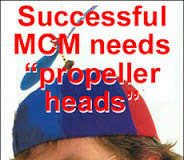
What stands in the way of more and faster success in getting cures to patients?
Newsweek posed this question to Andy Grove, former CEO of Intel, in a recent interview (“A Research Revolution“). You would think such a smart guy would come up with an enlightening and actionable answer. Instead, he came up with this:
“The peer review system in grant making and in academic advancement has the major disadvantage of creating conformity of thoughts and values. It’s a modern equivalent of a Middle Ages guild, where you have to sing a particular way to get grants, promotions and tenure. The pressure to conform [to prevailing ideas of what causes diseases and how best to find treatments for them] means you lose the people who want to get up and go in a different direction. There is no place for the wild ducks. The result is more sameness and less innovation. What we need is a cultural revolution in the research community, academic and non-academic. We need to give wild ducks the opportunity to emerge and quack their way to success. But cultural change can be driven only by action at the top.”
Wild Ducks May Also Be Quacks!
There’s a lot here to criticize. Grove, like many patients, is pissed off that there isn’t a cure for cancer — prostate cancer in his case. By grants, I suppose he means drug industry grants supplied to patient groups to disperse to any of the quacking “wild duck” physicians/institutions that patient organizations deem worthy. He could also be talking about academic research sponsored by pharmaceutical companies.
Grove wants faster results and irresponsible promises from the dug industry to deliver results:
“…you never hear an executive from a pharmaceutical company say, “Before the end of the year I’m going to have xyz drug,” the way Steve Jobs said the iPhone would be out on schedule. The heart of every high-tech executive has been, get the product into customers’ hands and ramp up production. That drive is just not present in pharma; the drive to get sufficient understanding and go for it is missing.”
I think most people in the dug industry — especially those on the research side — would beg to differ. Also, Grove’s “sufficient understanding” is a recipe for disaster in the pharmaceutical industry. Medical science is not as exact as the physics underlying computer chip development. There have been plenty of times where the drug industry has pushed through drugs to market with only a “sufficient understanding” of the risks, for example. A case in point would be Vioxx.
And when a drug that is pushed too quickly to market without more than a “sufficient understanding” of that market — ie, Pfizer’s Exubera — the cost can be very high ($2.8 billion in Exubera’s case).
I sought of agree with Grove when I read between the lines — if by “wild ducks” he means giving more power to younger researchers who are not set in their careers and who are willing to risk not the lives of patients but their jobs on pursuing their “quacky ways.” And this won’t happen unless there is cultural change at the top of pharmaceutical companies — especially getting rid of lawyers in those positions.









![6 Digital Tools at the Center of Healthcare Digitalization [INFOGRAPHIC]](http://ec2-54-175-84-28.compute-1.amazonaws.com/pharma-mkting.com/wp-content/uploads/2021/04/6DigitalTools_600px-100x70.jpg)




